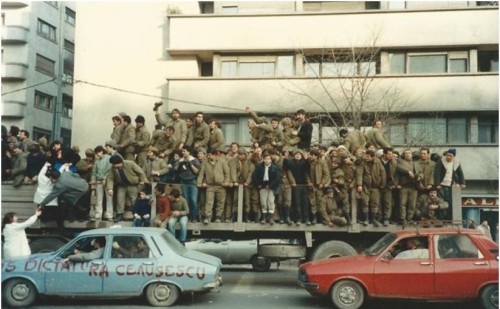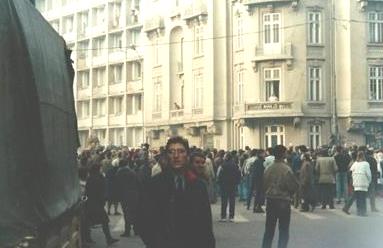11th December 2014
Romanian Revolution through British Eyes/ Richard Morris: ‘Awakening Romania’

The calm before December 1989 is as memorable to me as experiencing the revolution itself. Roll back a year to November 1988 and my arrival in a city blanketed by ice, snow and grey slush. More horse and carts on the airport road than cars and an introduction to faded and frozen communist grandeur through a stay at the Hotel Bucuresti. I felt I had walked into a black and white 1950s cold war spy movie weirdly overlaid with a Dickensian cityscape where ‘no wind that blew was bitterer, no falling snow was more intent, no pelting rain less open to entreaty’ (1).
Jump forward a year and an unexpectedly kind and mild early winter that some say helped the change that came to Romania that December. The contrast of 3 years in Bangladesh (no winter!) to arriving in Romania was stark. But my shock soon turned to awe as the city unfolded into the spectacular countryside beyond, to the Carpathian Mountains and the Moldavian and Transylvanian plateaus.
Bucharest, fading, frozen and suffering from systematisation (2) seemed forgotten and unloved. But I found the ‘Paris of the East’ and its people had a heart even if it was barely beating and in a Ceausescu induced coma. Skirmishes with the Securitate over Embassy contact with dissidents and time in a local police station for taking pictures of villages being bulldozed added to the adrenalin. Although pulling up floor boards and dismantling skirting boards in my apartment in the search for listening devices was perhaps a little over zealous!
A surreal moment in summer 1989 came with Bucharest host to the (last) Warsaw Pact meeting acting out the final scenes of an arranged marriage. I remember driving out onto Blvd Aviatorilor into the middle of Gorbachev’s motorcade, and being pulled to the side of the road by an irate soldier.
With autumn came the fall of the Berlin Wall. With no local media coverage or international news reception bar the BBC World Service, it wasn’t until the UK newspapers arrived that the enormity of change happening beyond Romania’s borders began to sink in. I remember the mood so clearly; the confidence that revolution would never come to Romania. Commentary within the Embassy was that the country was in for the long haul and any change only possible with the failing health or ‘natural’ death of Ceausescu. I remember the ‘World in 1990’ Economist publication arriving in early December and the prediction of a very long journey ahead for Romania and the beginnings of economic, political and social reform years away.
So there was nothing, not a sniff or hint of change. In an era of no internet or social networks, no international news, no foreign press community and not even direct dial phone lines it’s hard now to comprehend the communications blackout that the Romanian people lived under.
Then, on Saturday 16 December 1989, the protest started in Timisoara following the attempt by the authorities to evict Hungarian Reformed church pastor Laszlo Tokes. News filtered through to Bucharest and I remember reports from the Embassy 2nd Sec who had been there days before. Noise of unrest and demonstrations continued to filter through.


Late in the evening of Wednesday 20th December I was called into the Embassy and a message from the FCO in London. A British school skiing party had been denied entry at Otopeni airport. The border had closed. Romania was closing down to the world but things were finally on the turn. No one could predict what would unfold over the next few days.
It was a privilege but at times shocking experience to be on the streets during the revolution. I’ve included here just a few of my photos. Witnessing some of those who lost of their lives on December 21st was a sobering moment. But the following 18 months in an awakening Romania was one of the most memorable and exciting periods of my diplomatic career.’
(1) A Christmas Carol – Charles Dickens
(2) Systematisation – eight square kilometres in the historic centre of Bucharest were leveled – Alina Stefanescu, 2009
By Richard Morris
Former staff of British Embassy Bucharest
Disclaimer: This account does not represent the view of the Her Majesty’s British Government, but is a personal recollection of the December 1989 events in Romania.